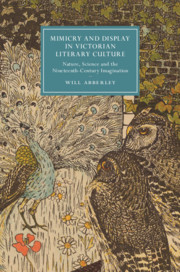 Mimicry and Display in Victorian Literary Culture
Mimicry and Display in Victorian Literary Culture Book contents
- Mimicry and Display in Victorian Literary Culture
- Cambridge Studies in Nineteenth-Century
- Mimicry and Display in Victorian Literary Culture
- Copyright page
- Contents
- Figures
- Acknowledgements
- Introduction
- Chapter 1 Seeing Things
- Chapter 2 Divine Displays
- Chapter 3 Criminal Chameleons
- Chapter 4 Darwin’s Little Ironies
- Chapter 5 Blending in and Standing out, I
- Chapter 6 Blending in and Standing out, II
- Conclusion
- Notes
- Bibliography
- Index
- Cambridge Studies in Nineteenth-Century Literature and Culture
Chapter 3 - Criminal Chameleons
The Evolution of Deceit in Grant Allen’s Fiction
Published online by Cambridge University Press: 16 May 2020
- Mimicry and Display in Victorian Literary Culture
- Cambridge Studies in Nineteenth-Century
- Mimicry and Display in Victorian Literary Culture
- Copyright page
- Contents
- Figures
- Acknowledgements
- Introduction
- Chapter 1 Seeing Things
- Chapter 2 Divine Displays
- Chapter 3 Criminal Chameleons
- Chapter 4 Darwin’s Little Ironies
- Chapter 5 Blending in and Standing out, I
- Chapter 6 Blending in and Standing out, II
- Conclusion
- Notes
- Bibliography
- Index
- Cambridge Studies in Nineteenth-Century Literature and Culture
Summary
Chapter 3 examines Grant Allen’s fictions of criminal deceit, contending that they were shaped by his ideas about adaptive appearance. As a science populariser, Allen wrote repeatedly about the evolutionary dynamics of animal crypsis and advertisement. His crime tales often echo these dynamics as criminals’ deceptions compete with others’ detecting capacities. It is argued that, in tales such as ‘The Curate of Churnside’, Allen’s Darwinian view of deception clashes with the conventions of the sensation genre he was writing in. The genre tended to affirm a balance of cosmic justice in which criminals were usually exposed, if not punished. Conversely, Allen’s criminals often elude detection, having adapted perfectly to their environments. Allen did not present humans as simply equivalent to animals, though. He nurtured the hope that humanity would one day transcend nature’s primitive economy of deception. His novel An African Millionaire depicts criminal deception as a product of dysfunctional capitalism to be superseded by science and socialism. This political utopianism was offset for Allen, however, by a social Darwinist pessimism that caused him to doubt humans’ ability to overcome egoistic deceit. Indeed, Allen sometimes regarded his work as a professional writer as part of capitalism’s recapitulation of nature’s deceptions.
- Type
- Chapter
- Information
- Mimicry and Display in Victorian Literary CultureNature, Science and the Nineteenth-Century Imagination, pp. 86 - 115Publisher: Cambridge University PressPrint publication year: 2020


